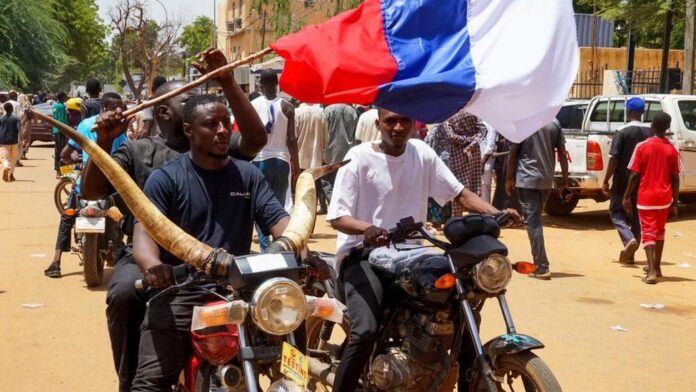In the wake of the recent coup in Niger, the West has found itself facing growing hostility from some factions within the country. The removal of President Mohamed Bazoum, a staunch ally of the West in the fight against militant Islamists and a strong economic partner, has created a rift in the traditional heartland.
A notable symbol of this growing divide is a businessman in the central city of Zinder, who proudly dons an outfit in the colors of the Russian flag. His decision to display Russian allegiance highlights the changing dynamics in the region since the coup led by General Abdourahamane Tchiani on July 26th.
Niger’s strategic importance to the West cannot be underestimated. As the world’s seventh biggest producer of uranium, the country supplies a significant portion of this vital fuel to Europe, especially to France, which hosts a military base in Niger. However, this close relationship with France has sparked discontent among some Nigeriens who feel their country’s resources have been exploited.
The businessman in Zinder echoes this sentiment, expressing his anti-French stance, claiming that France has taken advantage of Niger’s riches while leaving many citizens in extreme poverty. His decision to wear the Russian colors signifies not only a personal preference but also a broader movement gaining momentum across the country.
Thousands have taken part in protests in Niger’s capital, Niamey, and in other cities, with demonstrators waving Russian flags and even targeting the French embassy. While the exact motivations of these protestors remain multifaceted, there is an apparent surge in anti-French sentiment, possibly fueled by the perceived failure of French forces to effectively combat Islamist attacks in the region.

This shift in sentiment can be observed in other neighboring countries as well. Both Mali and Burkina Faso, former French colonies with considerable French interests, have experienced power seizures by their armies due to rising anti-French sentiments. In Mali, the junta welcomed Russia’s Wagner Group, which led to the expulsion of French troops and UN peacekeepers.
The M62 movement, a coalition of activists, civil society movements, and trade unions, has been at the forefront of escalating anti-French protests in Niger. Their grievances include the rising cost of living, poor governance, and the presence of French forces. With President Bazoum’s removal, the M62 appears reinvigorated, mobilizing mass protests in support of the junta and denouncing West African leaders’ sanctions over the coup.
However, it remains unclear whether the M62 movement is directly linked to the junta or Russia. Nonetheless, their call for Russian support in the form of security and agricultural technology signifies a growing alignment with Russian interests.
Despite the pro-Russia businessman’s optimism about Moscow’s potential to aid Niger in security and agriculture, not everyone shares his enthusiasm. A farmer in Zinder expresses concerns over foreign intervention, fearing that no foreign power, be it European or otherwise, will genuinely help the nation thrive.
As Niger faces a fragile future marked by internal divisions and geopolitical rivalries, finding a path toward stability, security, and prosperity will require careful navigation. The West, once a strong ally, now finds itself grappling with the aftermath of the coup and the emergence of new alliances in this dynamic region. The challenges ahead demand a cautious approach as Niger seeks to find its footing in an ever-changing geopolitical landscape.


